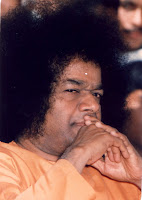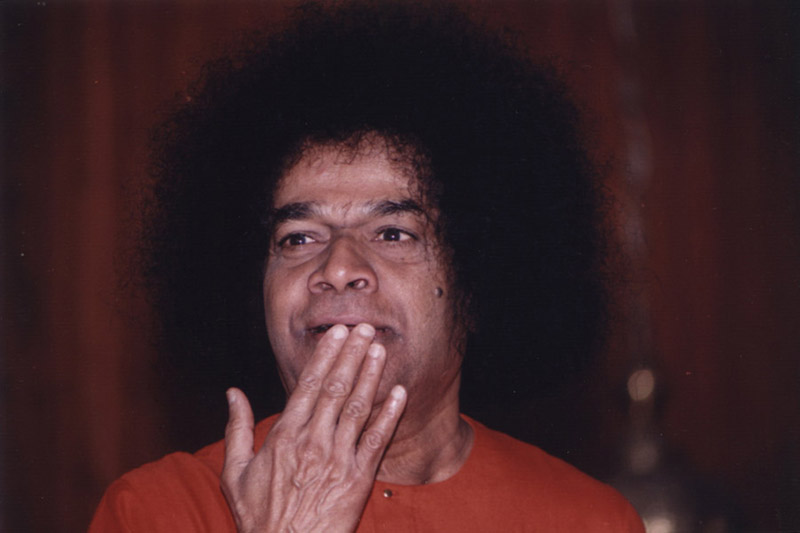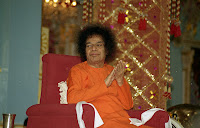Bhagawan says that one among the three beliefs that Bharathiyaas hold fast is the concept of Avatars. The other two being the law of Karma and the doctrine of rebirth. Humanity recognises only the momentary results of the advent of Avatar but as Bhagawan says, the only and very purpose of Avatar is to teach mankind the truth about Love. One such Avatar who displayed the principle of Love in every act of His is Lord Krishna.
Fortunate are we to be the contemporaries of the Poorna Avatar Bhagawan Sri Sathya Sai Baba. We are blessed to listen about other Avatars directly from Bhagawan Baba, which is like an auto-biography. In this posting, Bhagawan speaks about the birth of Krishna and the message of Krishna Avatar.
This posting is a collection of excerpts from the Divine Discourses of Bhagawan in the years 1989, 1990, 1991, 1995, 1996, 1997, 1998, 2001, 2003.
In the 1st audio clip, Bhagawan explains the reason and the essential factors why God incarnates. He goes on to explain in clip 1B, the beauty of Krishna Thatwa/Krishna principle. He then goes on to explain in clip 2A, the master plan of the Lord regarding taking up an Avatar as Krishna. In clip 2B, Bhagawan reveals the birthday of Krishna according to the English calendar. In clip 2C, He talks of the misunderstanding that prevails among people about timing of Krishna’s birth. He then goes on to explain in clip 2D, the true birthplace and the true birthday of Krishna. Bhagawan elaborates in clip 3A, the events immediately after Krishna’s birth. In clip 3B, Bhagawan talks about the naming ceremony of little Krishna. He explains in clip 4, different meanings and inner significance of the name ‘Krishna’. He talks of the supreme message of Krishna’s life in clip 5. In clips 6A, 6B, and 6C Bhagawan explains the three vows that Krishna took. Finally, in the 7th clip, Bhagawan explains the purpose of Avatars, and lessons that devotees must take home.
1A. Why Avatars Come-1995 May 21
Whenever cruelty, falsehood and unrighteousness reach intolerable proportions, God incarnates on Earth to destroy the wrongdoers. God Himself steps into the world. Why should God Himself come down? Could He not send His powers or deputies to complete this task? If there is a small case (disturbance), a police constable will come to the scene first. If it intensifies further it will be handled by a S.P (Superintendent of Police). If the case is even more demanding, the D.I.G (Deputy Inspector General of Police) will take it up. Beyond a limit, the I.G.P (Inspector General of Police) himself will look into the case. Therefore, based on the duties and task at hand, a suitable action needs to be undertaken. Today’s world is boiling with lots of agitation. Similarly, Kamsa’s reign was full of agitation. There was a sense of insecurity among all the citizens of the kingdom. They weren’t sure which Yadava would be ordered to be executed and beheaded. Nobody’s life was secure. They lived a life filled with fear and anxiety.
Under those circumstances, God decided to incarnate and destroy such wicked people. The advent of every Avatar has two reasons: one, the prayers of the devotees; and two, the atrocities of the wicked people. The unity of these two factors too is very essential.
Divinity summoned Maya Shakthi. Devaki Devi had conceived her seventh child. All the events were unfolding as per His master plan. Vasudeva had two wives. They were housed at Nanda’s place to be guarded against the atrocities of Kamsa. The Lord summoned Yoga Maya Shakti and instructed, “Devaki Devi had conceived her seventh child. Don’t keep this child in her womb any further. This child is an incarnation of Adishesha Himself. Now, transfer this child to the womb of Rohini”. Hence, Balarama (the child born to Rohini) is also called by the name Sankarshanudu. Sankarshana means “transferring from one place to another”. Thus, Maya Shakti transferred the seventh child from Devaki Devi’s womb to Rohini’s womb and assisted in the Divine master plan to annihilate the demons. The Lord further instructed Maya Shakti to enter into the womb of Yashoda (wife of Nanda). “I will Myself enter Devaki Devi’s womb as her eighth child.”
Krishna was born in the Krishnapaksha. What is Krishnapaksha? Krishnapaksha means darkness (the dark fortnight of the month). At night there will be no moonlight. It is full of darkness. In peacelessness (Ashanti) there is radiance (Prakaanti). In that radiance there is Supreme Light (Paramjyothi). This Supreme Light is verily the Divine (Paramatma). Light has its value in darkness alone, but not in brightness. Similarly, when the entire world was filled with restlessness (Ashanti), which is unrighteous, Krishna took birth as the Embodiment of supreme peace.
(Note – Lord Krishna was born in the month of Sravana. Bhagawan also brings out the significance of the word Sravanam (devout listening). In the discourse, Bhagawan goes on to talk about teaching the Bhagavad Gita to Arjuna through the path of Sravanam.)
3A. Birth Story of Krishna-1995 May 21
God Himself incarnated as the child. The Divine effulgence of the child illuminated the surroundings. Devaki and Vasudeva bowed to the child. What is the reason? They were aware that God would be born as their child. The Lord had appeared to them in a dream the previous night and, “I will take birth from your womb at dawn”. Indeed the Divine child incarnated. “But, what is the use ? How do we protect this child?”, thought the parents. They were worried about His safety. This was the impact of Maya, delusion! They knew He was Divine. How can they protect the Divine?
The Lord had already instructed Vasudeva to take the Divine child out soon after birth. Vasudeva placed the baby in a small basket and was wondering how he would go out. In a trice, the chains that tied his hands came loose. The doors flung open. It was three o’clock in the thick of the night. The gatekeepers were fast asleep. No one else was around. Vasudeva quietly walked out of the dungeon. As he proceeded, there was a tremendous downpour of rain. This was a sign of the intense joy; and purity of the occasion. Even the clouds were ecstatic at the Divine Advent. Placing the basket on his head, Vasudeva walked towards Gokulam. But, river Yamuna flowed across his path. When God Himself was going, who could obstruct Him? Adisesha covered the basket carrying the Divine child. The river parted and made way as they proceeded. At that very moment, Yashoda gave birth to Maya Shakti. Everyone was fast asleep at Gokulam also. Vasudeva switched the babies and returned. It was all done according to the Divine Command. But nobody believes this today. This was a Divine Plan.
In keeping with God’s command, Vasudeva placed the Lord next to Yashoda and returned to Mathura with the girl child. God’s ways are so mysterious! Only after Vasudeva returned and placed the baby girl next to Devaki Devi, did the guards wake up. The prison doors were found open and the guards were gripped with fear. The baby girl cried out loudly.
3B. Garga Names the Baby as Krishna-2001 Aug 11
Sage Garga went to the house of Yashoda and Nanda for the naming ceremony of the babies. He exclaimed, “What I am seeing here today is strange. I have never heard of this in my life!” Incarnations generally occur in three colours of Shukla (white), Aruna (orange) and Pita (yellow). But here was a baby who was black. Hence, Garga considered the name Krishna (black) as most appropriate.
4. Meaning of the Name Krishna-1990 Aug 14
We must understand properly the meaning of the term Krishna. The word has three meanings.
One is “Krishyathi iti Krishnah” (The one who cultivates is Krishna). What is it that has to be cultivated? The Hridayakshetra (field of the heart). Krishna cultivates the field of our hearts. He removes the weeds of bad thoughts, softens the heart by watering it with love, ploughs it through sadhana, and sows the seeds of Lord’s name. Thus, Krishna is one who cultivates our hearts.
The second meaning of the word is: “Karshathi iti Krishnah.” (The one who attracts is Krishna). Karsha refers to attraction. Krishna attracts you by His eyes, His speech, His sports, His flute. Everything related to Krishna is attractive. By His words, He softens and calms the hearts of even those filled with anger and makes them rejoice.
Krishna displayed these qualities even as a small child. Once He had entered the house of a gopika at night, climbed a pillar to get to the curds that were kept in a pot suspended from the ceiling. The gopika came with a lot of anger, caught Him in the act and held and blocked the pillar, saying that she would now expose Him before His mother Yashoda. She asked Him what He was doing at the top of the pillar. Krishna, in the most innocent manner, answered that He was searching for the calf that was missing from His house. The gopika could not contain her laughter at the answer. She laughed loudly and let go of the pillar to cover her mouth. This gave Him the chance to slide down the pillar and make a good escape. This way, every aspect of Krishna is full of attraction. He is attraction itself.
5. Prema Thatwa – Message of Life of Krishna-1989 Aug 24
What is the meaning of Sambhavam? One who expresses and manifests Himself according to His Will, unrestricted by rules, wherever and whenever necessary, is called as Sambhavaha.
The Bhagavad Gita says – Whenever righteousness declines, O Arjuna, and unrighteousness rises, I incarnate. To protect the pious and destroy the wicked, to establish dharma, I incarnate in every age.
The word Sambhavaami means: He incarnates whenever necessary, wherever necessary, not bound by any rules. Thus, man recognised the various qualities of God and attributed names describing each aspect.
Whoever it may be (Ye Janaah Pari Upaasate), if he thinks of Me (worships Me) all the time (Ananyaas Chintayanto Maam), I will take care of his/her day to day welfare (Teshaam Nityaabhi Yuktaanaam, Yogakshemam Vahaamyaham).
It must be Ananya Bhakti. If the devotion is limited to just oneself and one’s family, it becomes ordinary devotion. If one prays with the feeling that one should be fine and the society should also be fine, then it is somewhat better – medium level.
The one who understands the principle that all are one, all beings are one, he is the one with true infinite devotion (Ananya Bhakti). Ananya Bhakti does not mean Sarvada Sarvakaaleshu Sarvatra Harichintanam – that is praying to the Lord non-stop all the time. Ananya means not perceiving any differences; it means considering and seeing everybody as one. There is Divinity in everyone, everybody is essentially Divine.
6C. Sarva Dharmaan Parithyajya-1991 July 26
In the Bhagavad Gita, Krishna called upon Arjuna to renounce all Dharmas and seek refuge in Him alone – “Sarva Dharmaan Parityajya Maam Ekam Saranam Vraja.” What is meant by Dharma? In the present context, Dharma refers to the specific quality of each object. Heat, for instance, is the Dharma of fire in a burning charcoal. Without heat, it is mere charcoal. Sweetness is the Dharma (natural quality) of sugar. Without sweetness, it ceases to be sugar. It becomes sand. Likewise, there is a Dharma (natural tendency) for man. What is it? Desire for things. It is natural for man to multiply his desires. “Sarva Dharmaan Parithyajya” means giving up all desires. This is also called Vairagya (detachment).
Note: Following passage is extracted from a discourse given by Bhagawan on 6-9-1977
“Mokshayishyaami Maa Shucha”
(I shall save all those who surrender whole-heartedly to Me, and I shall liberate them from the cycle of birth and death). Thus Krishna assured man that He would save him from penury and grief and from sin and its terrible consequences, provided he adheres to Him and adores Him.Quiz

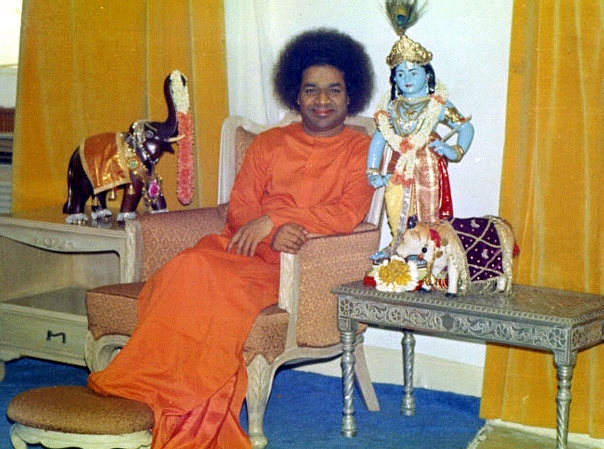
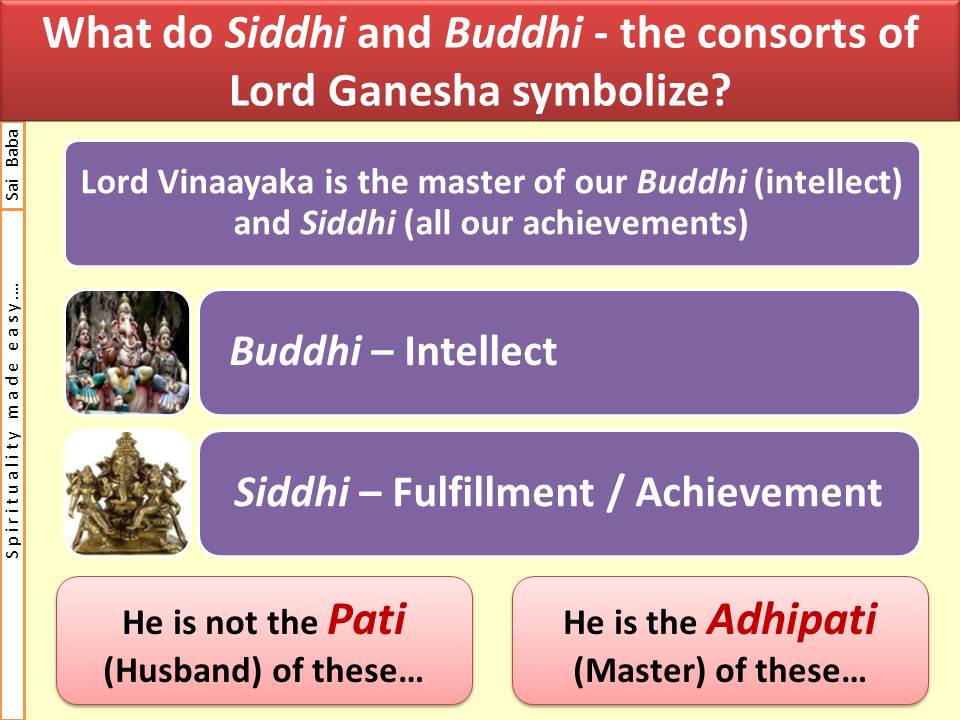












.jpg)















